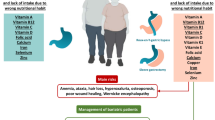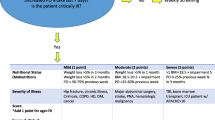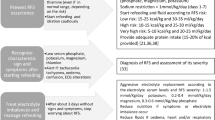Abstract
Background
We hypothesized that preoperative and/or postoperative enteral immune-enhanced formulas that are supplemented with arginine, omega-3 fatty acids, and RNA may reduce postoperative complications in patients undergoing esophagectomy for thoracic esophageal squamous cell carcinoma (ESCC).
Methods
Forty patients who underwent esophagectomy were divided into three groups: group A (n = 20) received a control enteral diet (Erental) through the jejunostomy after surgery. group B (n = 6) received an enteral diet supplemented with immune-enhancing substrates (Impact) containing arginine, omega-3 fatty acids, and RNA after surgery. group C (n = 14) received the impact before and after surgery.
Results
Lymphocyte counts in group C on postoperative day (POD) 7 were somewhat higher than that in group A (p = 0.07) and significantly higher than in group B (p = 0.03). Furthermore the incidence of incisional wound infection in group C was significantly lower than that in group A (p = 0.03). Moreover, the duration of postoperative systemic inflammatory response syndrome (SIRS) was significantly shorter in group C than in group A (p < 0.05).
Conclusions
This study reveals that the perioperative immune-enhanced formula may be superior to postoperative control enteral formulas in terms of reducing surgical wound infection and postoperative SIRS, which may result in serious postoperative complications for patients who have undergone esophagectomy.



Similar content being viewed by others
References
Ando N, Ozawa S, Kitagawa Y, et al. (2000) Improvement in the results of surgical treatment of advanced squamous esophageal carcinoma during 15 consecutive years. Ann Surg 232:225–232
Ando N, Iizuka T, Ide H, et al. (2003) Surgery plus chemotherapy compared with surgery alone for localized squamous cell carcinoma of the thoracic esophagus: A Japan Clinical Oncology group study-JCOG 9204. J Clin Oncol 21: 4592–4596
Gabor S, Renner H, Matzi V, et al. (2005) Early enteral feeding compared with parenteral nutrition after oesophageal or oesophagogastric resection and reconstruction. Br J Nutr 93:509–513
Aiko S, Yoshizumi Y, Sugiura Y, et al. (2001) Beneficial effects of immediate enteral nutrition after esophageal cancer surgery. Surg Today 31: 971–978
Martin LW, Swisher SG, Hofstetter W, et al. (2005) Intrathoracic leaks following esophagectomy are no longer associated with increased mortality. Ann Surg 242: 392–399
Ryan AM, Rowley SP, Healy LA, et al. (2006) Postoesophagectomy early enteral nutrition via a needle catheter jejunostomy: 8-year experience at a special unit. Clin Nutr 25:386–393
McCowen KC, Bistrian BR (2003) Immunonutrition: problematic or problem solving? Am J Clin Nutr 77: 764–770
Farreras N, Artigas V, Cardona D, et al. (2005) Effect of early postoperative enteral immunonutrition on wound healing in patients undergoing surgery for gastric cancer. Clin Nutr 24:55–65
Xu J, Zhong Y, Jing D, et al. (2006) Preoperative enteral immunonutrition improves postoperative outcome in patients with gastrointestinal cancer. World J Surg 30:1284–1289
Alvarez W, Mobarhan S (2003) Finding a place for immunonutrition. Nutr Rev 61:214–218
Yeh CL, Yeh SL, Lin MT, et al. (2002) Effects of arginine-enriched total parenteral nutrition on inflammatory-related mediator and T-cell population in septic rats. Nutrition 18:631–635
Whitaker MO, Wyche A, Fitzpatrick F, et al. (1979) Triene prostaglandins: prostaglandin D3 and icosapentanoic acids as potential antithrombotic substances. Proc Natl Acad Sci USA 76:5919–5923
Fischer S, Weber PC (1984) Prostaglandin I3 is formed in vivo in man after dietary eicosapentaenoic acid. Nature 307:165–168
Mayer K, Gokorsch S, Fegbeutel C, et al. (2003) Parenteral nutrition with fish oil modulates cytokine response in patients with sepsis. Am J Respir Crit Care Med 167:1321–1328
Kulkarni AD, Fanslow WC, Rudolph FB, et al. (1986) Effect of dietary nucleotides on response to bacterial infections. JPEN J Parenter Enteral Nutr 10:169–171
Riso S, Aluffi P, Brugnani M, et al. (2000) Postoperative enteral immunonutrition in head and neck cancer patients. Clin Nutr 19:407–412
Japanese Society for Esophageal Diseases (1999) Guidelines for the Clinical and Pathologic Studies on Carcinoma of the Esophagus, 9th Edition, Tokyo, Kanehara Publishing Co
Bone RC, Balk RA, Cerra FB, et al. (1992) ACCP/SCCM Consensus Conference: definitions for sepsis and organ failure and guidelines for the use of innovative therapies in sepsis. Chest 101:1644–1655
Ateş E, Yilmaz S, Erkasap E, et al. (2004) Perioperative immunonutrition ameliorates the postoperative immune depression in patients with gastrointestinal system cancer (prospective clinical study in 42 patients). Acta Gastroenterol Belg 67:250–254
Daly JM, Weintraub FN, Shou J, et al. (1995) Enteral nutrition during multimodal therapy in upper gastrointestinal cancer patients. Ann Surg 221:327–338
Aiko S, Yoshizumi Y, Tsuwano S, et al. (2005) The effect of immediate enteral feeding with a formula containing high levels of ω-3 fatty acids in patients after surgery for esophageal cancer. JPEN J Parenter Enteral Nutr 29:141–147
Wu GH, Zhang YW, Wu ZH (2001) Modulation of postoperative immune and inflammatory response by immune-enhancing enteral diet in gastroinetestinal cancer patients. World J Gastroenterol 7:357–362
Tsujinaka T, Kido Y, Ogawa M, et al. (1990) Postoperative hyperbilirubinemia after resection of thoracic esophageal cancer. Am J Gastroenterol 85:1473–1479
Sakurai Y, Oh-Oka Y, Kato S, et al. (2006) Effects of long-term continuous use of immune-enhancing enteral formula on nutritional and immunologic status in non-surgical patients. Nutrition 22:713–721
Endres S, Ghorbani R, Kelly VE, et al. (1989) The effect of dietary supplementation with n-3 polyunsaturated fatty acids on the synthesis of interleukin-1 and tumor necrosis factor by mononuclear cells. N Engl J Med 320:265–271
Meydani SN, Endres S, Woods MM, et al. (1991) Oral (n-3) fatty acid supplementation suppresses cytokine production and lymphocytes proliferation: comparison between young and older woman. J Nutr 121:547–555
Trebble TM, Wootton SA, Miles EA, et al. (2003) Prostaglandin E2 production and T cell function after fish-oil supplementation: response to antioxidant. Am J Clin Nutr 78:376–382
Zhao Y, Joshi-Barve S, Barve S, et al. (2004) Eicosapentanoic acid prevents LPS-induced TNF-alpha expression by preventing NF-kappaB activation. J Am Coll Nutr 23:71–78
Denys A, Hichami A, Khan NA (2005) n-3 PUFAs modulate T-cell activation via protein kinase C-alpha and epsilon and the NF-kappaB signaling pathway. J Lipid Res 46:752–758
Braga M, Gianotti L, Radaelli G, et al. (1999) Perioperative immunonutirion in patients undergoing cancer surgery: results of a randomized double-blind phase 3 trial. Arch Surg 134:428–433
Weinmann A, Bastian L, Bischoff WE, et al. (1998) Influence of arginine, omega-3 fatty acids and nucleotide-supplemented enteral support on systemic inflammatory response syndrome and multiple organ failure in patients after severe trauma. Nutrition 14:165–172
von Schacky C (2007) Omega-3 fatty acids and cardiovascular disease. Curr Opin Clin Nutr Metab Care 10:129–135
Author information
Authors and Affiliations
Corresponding author
Rights and permissions
About this article
Cite this article
Takeuchi, H., Ikeuchi, S., Kawaguchi, Y. et al. Clinical Significance of Perioperative Immunonutrition for Patients with Esophageal Cancer. World J Surg 31, 2160–2167 (2007). https://doi.org/10.1007/s00268-007-9219-8
Published:
Issue Date:
DOI: https://doi.org/10.1007/s00268-007-9219-8




